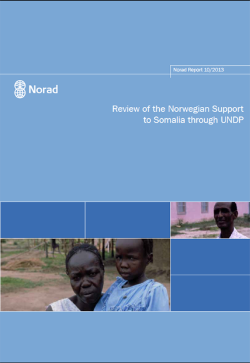Review of the Norwegian Support to Somalia through UNDP
Om publikasjonen
- Utgitt: august 2013
- Serie: Norads rapportserie
- Type: Norad-rapport
- Utført av: Scanteam
- Bestilt av: Norad
- Land: Somalia
- Tema: Styresett og demokrati, Multilaterale institusjoner, Konflikt, fred og sikkerhet
- Antall sider: 68
- Serienummer: 10/2013
- ISBN: 978-82-7548-703-0
- ISSN: --

NB! Publikasjonen er KUN tilgjengelig elektronisk og kan ikke bestilles på papir
UNDP´s main motivation is to support the country to manage conflict and to build individual, regional and national resilience to environmental, economic and conflict-based shocks. It is often repeated by partners and beneficiaries in Somalia that UNDP is bureaucratic and slow to take action. In spite of this, almost everybody seems to agree that there is no alternative to the UNDP when it comes to delivering many of the crucial and strategic services related to governance and rule of law as part of peace-building and state-building in Somalia. The report summary concludes on the various components as follows (abbreviated):
- The support offered to the strengthening of rights-based civilian policing has produced progress in this crucial area of security provision, although quite unevenly between the three state units supported by UNDP – with Somaliland evidently taking a lead.
- Access to justice has improved considerably as a consequence of the UNDP program (along with other support).
- To build community security in Somalia is most of all a question of how to engage young people in a meaningful way, by involving local leaders and representatives with real legitimacy. This has to a large extent been achieved in a number of around the country.
- The Somali Institutional Development Project (SIDP) has been working around several pillars, some more successfully implemented than others. There are examples of good development planning with emphasis on strong local participation and priority-setting – in keeping with a Somali bottom-up tradition not least developed during the stateless era.
- Within local governance and decentralized delivery, the UNDP pilot program represents a very encouraging bottom-up engagement with local authorities, building capacity at the root. The scaling up potential is considerable.
- The UNDP project Poverty-Reduction and Environmental Protection (PREP) has had very limited funding. A real attack on the major socio-economic challenges – with youth unemployment being the most important of all – requires a much more massive investment than the UNDP can provide. However, some of the PREP interventions may be used as pilot experiences, when major donor efforts through multi-donor funds, the World Bank etc. fall into place.
- There are several examples of good achievements with gender equality and women´s empowerment. Of particular importance has been the strengthening of women´s political participation and of their role in the justice system.
- A completely new approach to a federation-building process is required if the ambition to build popular support and trust and not least to include Somaliland and other sub-national units is to be maintained. The UN system (both UNSOM and UNDP) is expected to play a major role in this, and the donor community should accompany the UN in outreach activities and in mentoring the federal authorities to take a much more conciliatory and statesmanlike attitude particularly to the Somaliland government.
Publisert 15.08.2013
Sist oppdatert 16.02.2015
